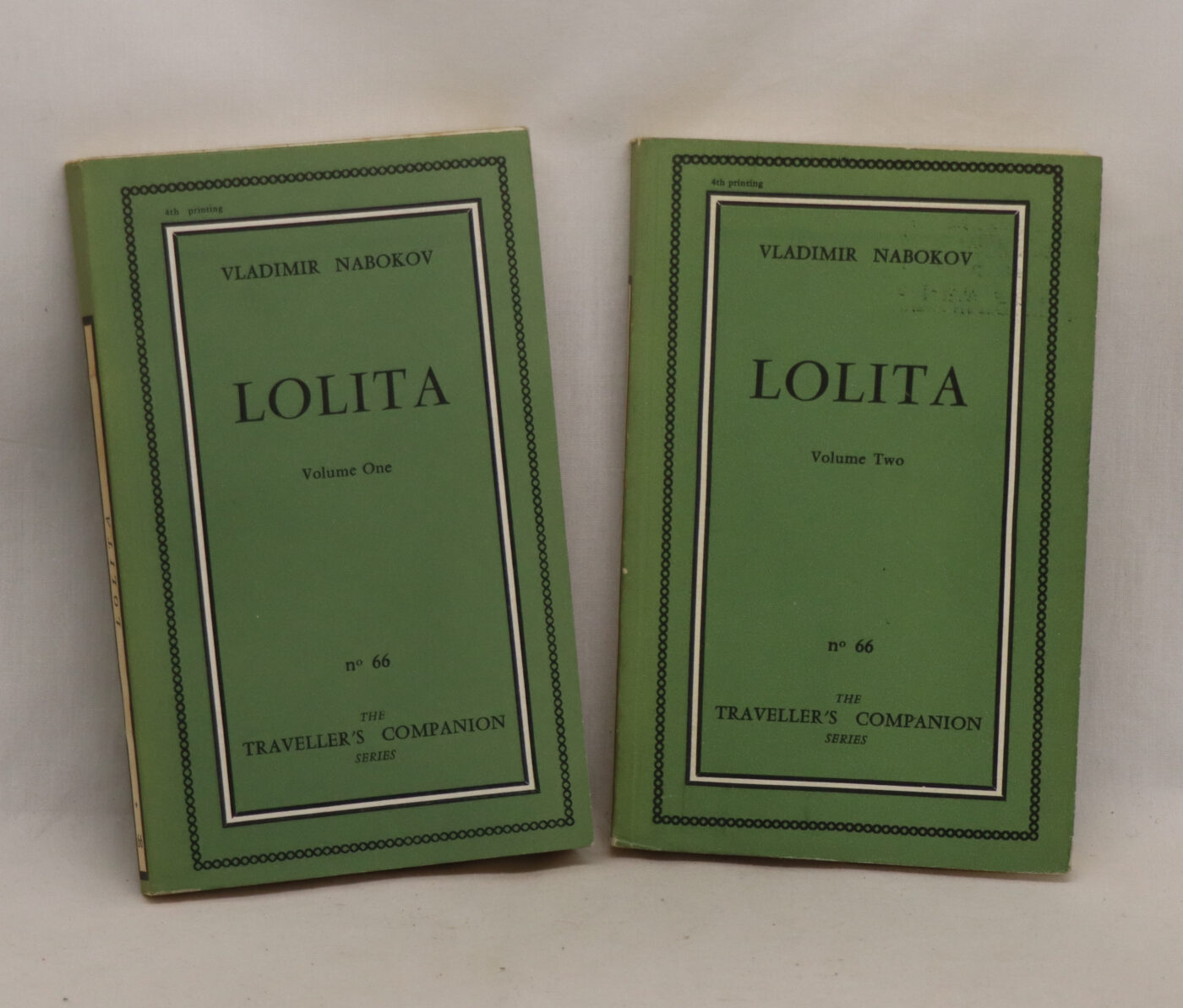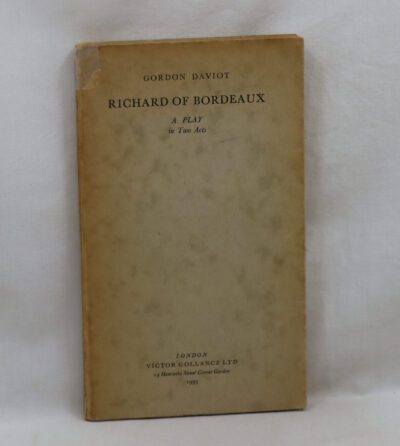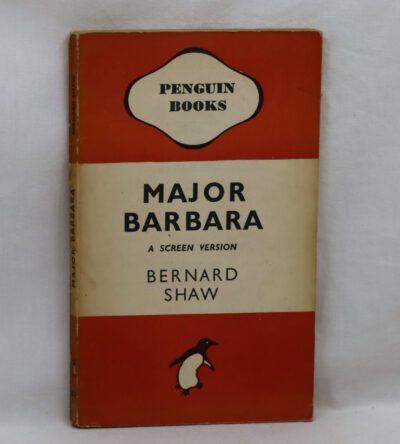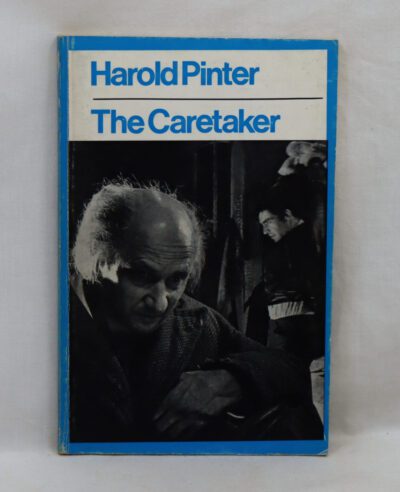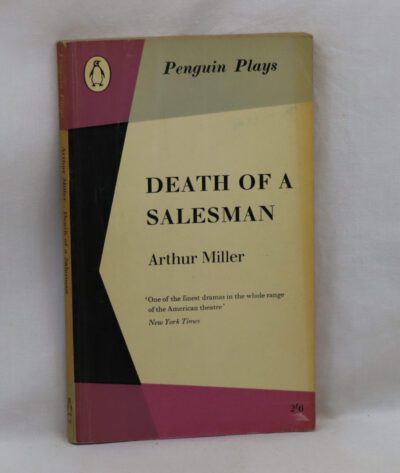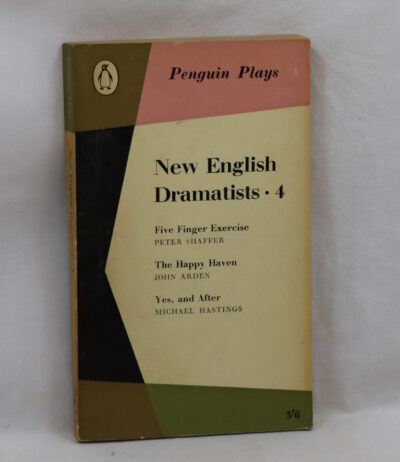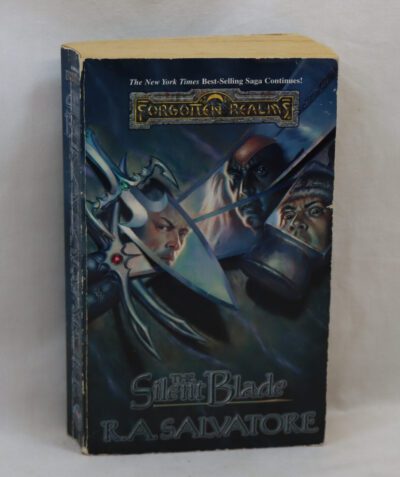Lolita. Books 1 & 2.
By Vladimir Nabokov
Printed: 1959
Publisher: The Olympia Press. Paris
| Dimensions | 11 × 18 × 1 cm |
|---|---|
| Language |
Language: English
Size (cminches): 11 x 18 x 1
Condition: Fine (See explanation of ratings)
FREE shipping
Your items
Item information
Description
Paperback. Green cover with black title. Dimensions are for one volume. With a newly made presentation box.
Warning: This book was part of the erotic library gathered by the famous Cambridge Don, computer scientist, food and wine connoisseur, Jack Arnold LANG, along with medical friends and family involved in Freudian research. Sexual instincts or drives have deeply hidden roots in the unconscious mind. Instincts act by giving vitality and enthusiasm to the mind through meaning and purpose. The range of instincts is in great numbers. Freud expressed them in two categories. One is Eros, the self-preserving life instinct containing all erotic pleasures. While Eros is used for basic survival, the living instinct alone cannot explain all behavior, according to Freud. In contrast, Thanatos is the death instinct. It is full of self-destruction of sexual energy and our unconscious desire to die. The main part of human behavior and actions is tied back to sexual drives. Since birth, the existence of sexual drives can be recognized as one of the most important incentives of life. The enclosed book was part of this research. A photograph is enclosed, should you seek further details please contact Martin Frost on martin.frost@gmail.com
Foremost amongst erotic books collected by Jack Arnold Lang are those published in France by the Olympia Press. The Olympia Press was a Paris-based publisher, launched in 1953 by Maurice Girodias as a rebranded version of the Obelisk Press he inherited from his father Jack Kahane. It published a mix of erotic fiction and avant-garde literary fiction, and is best known for issuing the first printed edition of Vladimir Nabokov’s Lolita.
In its heyday during the mid-fifties Olympia Press specialized in books which could not be published (without legal action) in the English-speaking world. Early on, Girodias relied on the permissive attitudes of the French to publish sexually explicit books in both French and English. In the late 1950s,the French authorities began to ban and seize the press’s books.
A total of 94 Olympia Press publications were promoted and packaged as “Traveller’s Companion” books, usually with simple text-only covers, and each edition in the series was numbered. The “Ophelia Press” line of erotica was far larger, using the same design, but pink covers instead of green.
Olympia Press was the first publisher willing to print William S. Burroughs’s avant-garde, sexually explicit Naked Lunch, which soon became famous. Other notable works included J. P. Donleavy’s The Ginger Man; Samuel Beckett’s French trilogy Molloy, Malone Dies, and The Unnamable; Henry Miller’s trilogy The Rosy Crucifixion, consisting of Sexus, Nexus and Plexus; A Tale of Satisfied Desire by Georges Bataille; Story of O by Pauline Réage; Terry Southern and Mason Hoffenberg’s Candy; Alex Austin’s The Blue Guitar and Eleanore; and a critical book on Scientology, Inside Scientology/Dianetics by Robert Kaufman. The South African poet Sinclair Beiles was an editor at the publisher. Other authors included Alexander Trocchi, Iris Owens (Harriet Daimler) and John Stevenson (Marcus Van Heller).
Girodias had troubled dealings with his authors including copyright issues. Nabokov was dissatisfied with the copyediting, assignment of copyright and the press’s literary reputation. The press engaged in a long-running dispute over the rights to The Ginger Man ended with Donleavy’s wife Mary buying out Girodias at what was intended to be a closed auction. Forced to leave France in 1963, Girodias briefly reestablished Olympia Press in New York in the 1960s, and in London in the early 1970s.
Grove Press in the U.S. would later print The Olympia Reader, a best-selling anthology containing material from some of Olympia’s most popular works, including material by Burroughs, Miller, Trocchi and others. Another well-known collection was The Best of Olympia, first published by the Olympia Press in 1963 and reprinted by New English Library in 1966.
Other incarnations of the company, some with Girodias’ support, emerged in Germany, Italy, and the United Kingdom. Olympia Press has been re-established and is currently operating out of Washington, London, and Frankfurt.
First edition, fourth printing. First edition, fourth printing. 2 vols. 12mo. The fourth printing of Nabokov’s immortal nymphet in its original form. Green printed wrappers. Some shelfwear, but near fine.
Lolita is a 1955 novel written by Russian and American novelist Vladimir Nabokov. The protagonist and narrator is a French literature professor who moves to New England and writes under the pseudonym Humbert Humbert. He details his obsession and victimization of a 12-year-old girl, Dolores Haze, whom he describes as a “nymphet”. Humbert kidnaps and sexually abuses Dolores after becoming her stepfather. Privately, he calls her “Lolita”, the Spanish diminutive for Dolores. The novel was written in English, but fear of censorship in the U.S. (where Nabokov lived) and Britain led to it being first published in Paris, France, in 1955 by Olympia Press.
The book has received critical acclaim regardless of the controversy it caused with the public. It has been included in many lists of best books, such as Time‘s List of the 100 Best Novels, Le Monde‘s 100 Books of the Century, Bokklubben World Library, Modern Library’s 100 Best Novels, and The Big Read. The novel has been twice adapted into film: first in 1962 by Stanley Kubrick, and later in 1997 by Adrian Lyne. It has also been adapted several times for the stage.
Vladimir Vladimirovich Nabokov (22 April [O.S. 10 April] 1899 – 2 July 1977), also known by the pen name Vladimir Sirin, was a Russian and American novelist, poet, translator, and entomologist. Born in Imperial Russia in 1899, Nabokov wrote his first nine novels in Russian (1926–1938) while living in Berlin, where he met his wife, Véra Nabokov. He achieved international acclaim and prominence after moving to the United States, where he began writing in English. Trilingual in Russian, English, and French, Nabokov became a U.S. citizen in 1945 and lived mostly on the East Coast before returning to Europe in 1961, where he settled in Montreux, Switzerland.
From 1948 to 1959, Nabokov was a professor of Russian literature at Cornell University. His 1955 novel Lolita ranked fourth on Modern Library’s list of the 100 best 20th-century novels in 1998 and is considered one of the greatest works of 20th-century literature. Nabokov’s Pale Fire, published in 1962, ranked 53rd on the same list. His memoir, Speak, Memory, published in 1951, is considered among the greatest nonfiction works of the 20th century, placing eighth on Random House’s ranking of 20th-century works. Nabokov was a seven-time finalist for the National Book Award for Fiction. He also was an expert lepidopterist and composer of chess problems. Time magazine wrote that Nabokov had “evolved a vivid English style which combines Joycean word play with a Proustian evocation of mood and setting”.
Want to know more about this item?

Related products
Share this Page with a friend

